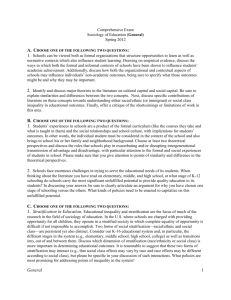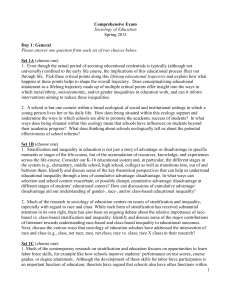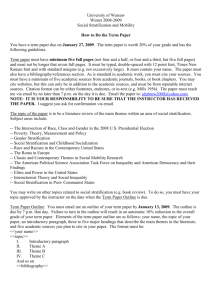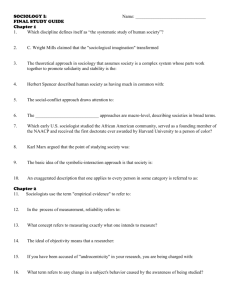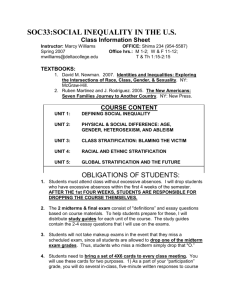SOCIOLOGY 5035 SOCIAL STRATIFICATION Spring, 2000
advertisement
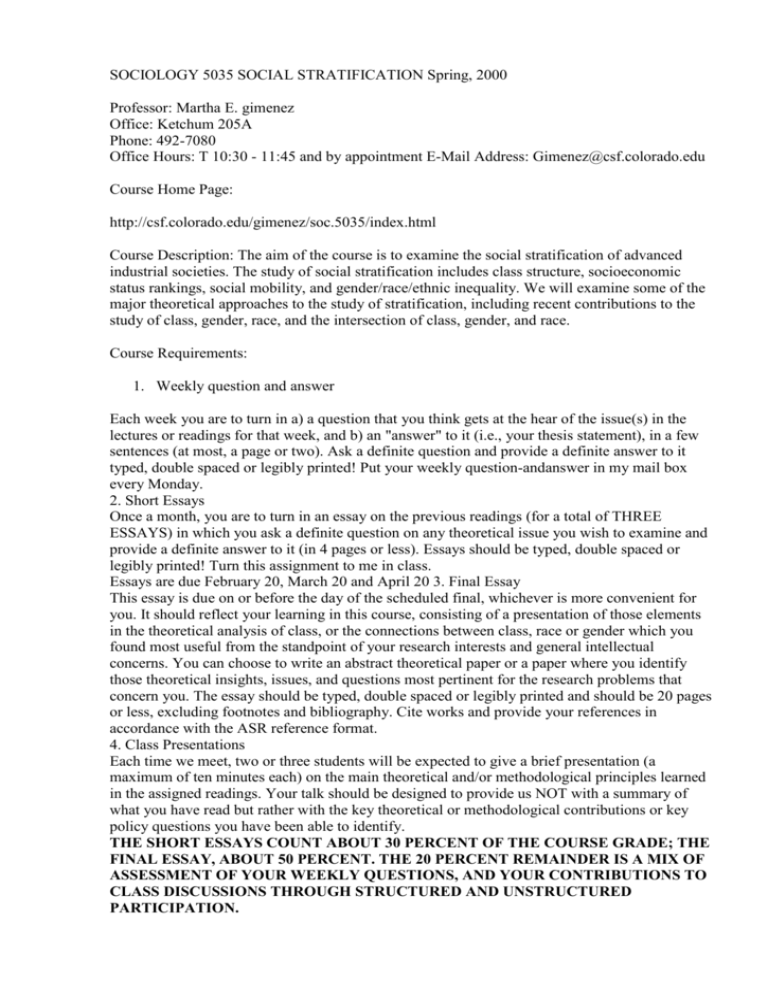
SOCIOLOGY 5035 SOCIAL STRATIFICATION Spring, 2000 Professor: Martha E. gimenez Office: Ketchum 205A Phone: 492-7080 Office Hours: T 10:30 - 11:45 and by appointment E-Mail Address: Gimenez@csf.colorado.edu Course Home Page: http://csf.colorado.edu/gimenez/soc.5035/index.html Course Description: The aim of the course is to examine the social stratification of advanced industrial societies. The study of social stratification includes class structure, socioeconomic status rankings, social mobility, and gender/race/ethnic inequality. We will examine some of the major theoretical approaches to the study of stratification, including recent contributions to the study of class, gender, race, and the intersection of class, gender, and race. Course Requirements: 1. Weekly question and answer Each week you are to turn in a) a question that you think gets at the hear of the issue(s) in the lectures or readings for that week, and b) an "answer" to it (i.e., your thesis statement), in a few sentences (at most, a page or two). Ask a definite question and provide a definite answer to it typed, double spaced or legibly printed! Put your weekly question-andanswer in my mail box every Monday. 2. Short Essays Once a month, you are to turn in an essay on the previous readings (for a total of THREE ESSAYS) in which you ask a definite question on any theoretical issue you wish to examine and provide a definite answer to it (in 4 pages or less). Essays should be typed, double spaced or legibly printed! Turn this assignment to me in class. Essays are due February 20, March 20 and April 20 3. Final Essay This essay is due on or before the day of the scheduled final, whichever is more convenient for you. It should reflect your learning in this course, consisting of a presentation of those elements in the theoretical analysis of class, or the connections between class, race or gender which you found most useful from the standpoint of your research interests and general intellectual concerns. You can choose to write an abstract theoretical paper or a paper where you identify those theoretical insights, issues, and questions most pertinent for the research problems that concern you. The essay should be typed, double spaced or legibly printed and should be 20 pages or less, excluding footnotes and bibliography. Cite works and provide your references in accordance with the ASR reference format. 4. Class Presentations Each time we meet, two or three students will be expected to give a brief presentation (a maximum of ten minutes each) on the main theoretical and/or methodological principles learned in the assigned readings. Your talk should be designed to provide us NOT with a summary of what you have read but rather with the key theoretical or methodological contributions or key policy questions you have been able to identify. THE SHORT ESSAYS COUNT ABOUT 30 PERCENT OF THE COURSE GRADE; THE FINAL ESSAY, ABOUT 50 PERCENT. THE 20 PERCENT REMAINDER IS A MIX OF ASSESSMENT OF YOUR WEEKLY QUESTIONS, AND YOUR CONTRIBUTIONS TO CLASS DISCUSSIONS THROUGH STRUCTURED AND UNSTRUCTURED PARTICIPATION. REQUIRED READINGS Books Kim, Jim Yong et al, Global Inequality and the Health of the Poor. Common Courage Press, 2000. Shapiro, Thomas. M. Great Divides. Readings in Social Inequality in the United States. Mountain View, CA: Mayfield Publishing Company, 2001. (TS) Skeggs, Beverly. Formations of Class & Gender. Thousand Oaks, CA: Sage Publications, 1997. (S) Wood, Ellen Meiksins. The Retreat from Class. A New "True" Socialism. London, UK: Verso, 1986. (MW) Wright, Erik O. Interrogating Inequality. Essays on Class Analysis, Socialism and Marxism. London, UK: Verso, 1996. (W) Articles Martha E. Gimenez, "The Feminization of Poverty: Myth or Reality?" * ____________"Marxist and Non-Marxist Elements in Engels' Views on the Oppression of Women." * ____________"Minorities and the World-System: Theoretical and Methodological Implications of the Internationalization of Minorities." * ____________ " On Reserve at the library. Optional Steven Rose, THE AMERICAN POSTER BOOK. ADDITIONAL BIBLIOGRAPHY Books Etienne Balibar, MASSES, CLASSES, IDEAS. Studies on Politics snf Philosophy Before and After Marx. Routledge, 1994. Etienne Balibar and Immanuel Wallerstein, RACE, NATION, CLASS. Ambiguous Identities. Verso, 1991. E. Digby Baltzell, PHILADELPHIA GENTLEMEN. The Making of a National Upper Class. University of Pennsylvania Press, 1979. Loren Baritz, THE GOOD LIFE. The Meaning of Success for the American Middle Class. Harper & Row, 1990. Denny Braun, THE RICH GET RICHER. The Rise of Income Inequality in the United States and the World. Nelson-Hall, 1991. Peter Calvert, THE CONCEPT OF CLASS. An Historical Introduction. St. Martin's Press, 1982. Alan Carling, SOCIAL DIVISION. Verso, 1991. Rosemary Crompton and M. Mann, eds., GENDER AND STRATIFICATION. Polity Press, 1986. G. William Domhoff, WHO RULES AMERICA NOW? A View for the 80s. Prentice Hall, 1983. Barbara Ehrenreich, FEAR OF FALLING. The Inner Life of the Middle Class. Harper Collins, 1989. Anthony Giddens and David Held, CLASSES, POWER, AND CONFLICT. Classical and Contemporary Debates. University of California Press, 1982. Michael Harrington, THE OTHER AMERICA. Poverty in the United States. Penguin Books, 1981. Patrick Joyce, ed., CLASS. Oxford University Press, 1995. Andrew Levinson, THE WORKING CLASS MAJORITY. Penguin, 1974. Ferdinand Lundberg, THE RICH AND THE SUPER-RICH. Bantam, Jay MacLeod, AIN'T NO MAKIN' IT. Aspirations and Attainment in a Low Income Neighborhood. Westview Press, 1995. Georg Lukacs, HISTORY AND CLASS CONSCIOUSNESS. The Merlin Press, Ltd., 1971. Katherine S. Newman. FALLING FROM GRACE. The Experience of Downward Mobility in the American Middle Class. Vintage books, 1989. Katherine S. Newman, DECLINING FORTUNES. The Withering of the American Dream. Basic Books, 1993. Michael Omi and H. Wynant, RACIAL FORMATION IN THE UNITED STATES. Routledge & Kegan Paul, 1986. Lars Osberg, ECONOMIC INEQUALITY IN THE UNITED STATES. M. E. Sharpe, Inc., 1984. Richard Parker, THE MYTH OF THE MIDDLE CLASS. Notes on Affluence and Equality. Liveright, 1982. Frank Parkin, CLASS INEQUALITY & POLITICAL ORDER. Social Stratification in Capitalist and Communist Societies. Praeger, 1972. Caroline Ramazanoglu, FEMINISM AND THE CONTRADICTIONS OF OPPRESSION. Routledge, 1989. John E. Schwarz, THE FORGOTTEN AMERICANS. Thirty Million Working Poor in the Land of Opportunity. W. W. Norton, 1993. Joan Smith et al, eds., RACISM, SEXISM, AND THE WORLD-SYSTEM. Greenwood Press, 1988. E. P. Thompson, THE MAKING OF THE ENGLISH WORKING CLASS. Viking Books, 1963. Arthur Vidich, THE NEW MIDDLE CLASSES. Life Styles, Status Claims and Political Orientations. New York University Press, 1995. Erik O. Wright, ed., THE DEBATE ON CLASSES. Verso, 1989 Journals AMERICAN SOCIOLOGICAL REVIEW AMERICAN JOURNAL OF SOCIOLOGY HISTORICAL MATERIALISM NEW LEFT REVIEW RACE, SEX, & CLASS RETHINKING MARXISM SCIENCE & SOCIETY THEORY AND SOCIETY Scheduled Readings I have only scheduled readings for twelve weeks to preserve flexibility, thus allowing us to spend more time on those readings and issues students consider more important in light of their current interests. Week I Introduction - Organization Opportunity and Inequality in the United States. (TS) Introduction (W, pp. 19-20) Inequality (W, pp. 21-31) Week II Readings for Week 1, plus Marx and Engels, Manifesto of the Communist Party Marx, Classes (TS, pp. 31-38) Weber, Class, Status, Party (TS, pp. 39-48) Week III Davis and Moore, Some Principles of Stratification M. Tumin, Some Principles of Stratification: A Critical Analysis (TS, pp. 79-95) Gans, The Uses of Undeservingness (TS, pp. 96-105) Week IV Wright, A General Framework for the Analysis of Class (TS, pp. 108-122) Wright, The Class Analysis of Poverty (W, pp. 32-50) Martha E. Gimenez, "The Feminization of Poverty: Myth or Reality?" * Week V C. Wright Mills, The Structure of Power in American Society (TS, pp. 139-145) Olsen, Sociopolitical Pluralism (TS, pp. 145-149) Domhoff, The American Upper Class (TS, pp. 150-158) Week VI Wright, The Status of the Political in the Concept of Class Structure (W, pp. 51-71) Wright, Class and Politics (W, pp. 88-106) E. Meiksins Wood, The Retreat From Class Week VII E. Meiksins Wood, The Retreat From Class Bonacich, A Theory of Ethnic Antagonism: The Split Labor Market (TS, pp. 53-66) Gimenez, "Minorities and the World System." * Wilson, The Truly Disadvantaged (TS, pp. 221-239) Oliver and Shapiro, A Sociology of Wealth and Racial Inequality (TS, pp. 240-249) Oliver and Shapiro, Black Wealth/While Wealth Gimenez, Muschert and Fothergill, "Wealth, Class amd Race." * Week VIII Dalton Conley, Being Black, Living in the Red. Week IX Lieberson, A Piece of the Pie: Occupational Trends (TS, pp. 261-271) Massey and Denton, The Continuing Causes of Segregation (TS, pp. 272-287) Portes and Manning, The Immigrant Enclave: Theory and Empirical Examples (TS, pp. 300-311) Wallerstein, "The Construction of Peoplehood: Racism, Nationalism, Ethnicity." * Rubin, Race and the Rise of Ethnicity (TS, pp. 173-178) Week X Hartmann, Capitalism, Patriarchy, and Job segregation by Sex (TS, pp. 49-52) Gimenez, " Marxism and Feminism."* Gimenez, "Marxist and Non-Marxist Elements in Engels' Views on the Oppression of Women." * B. Skeggs, Formations of Class and Gender Week XI B. Skeggs, Formations of Class and Gender Week XII Quadagno, The Politics of Motherhood (TS, pp. 335-345) Morrison et al, The Ceiling and the Wall: The Double Barrier to the Top (TS, pp. 346-353) Gerson, No Man's Land: Introduction (TS, pp. 354-368) Reskin and Padavic, Women, Men and Work in the Twenty First Century (TS, pp. 369-279)
